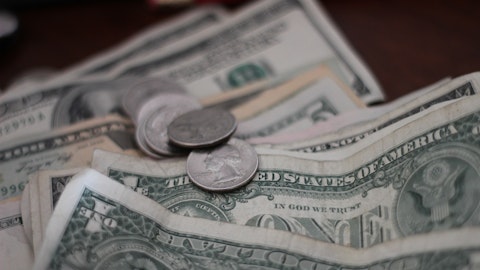Gladstone Investment Corporation (NASDAQ:GAIN) Q1 2024 Earnings Call Transcript August 3, 2023
Operator: Greetings and welcome to the Gladstone Investment Corporation First Quarter Earnings Call. At this time, all partiicpnats are in a listen-only mode. A brief question-and-answer session will follow the formal presentation. [Operator Instructions] As a reminder, this conference is being recorded. It is now my pleasure to introduce your host, David Gladstone, Chief Executive Officer. Thank you, Sir. You may begin.
David Gladstone: Thank you, Latanya. This is David Gladstone. This is our first quarter fiscal year 2024. It ends June 30 and the yearend is nine months or so away, earnings conference call, and this is for shareholders and analysts of Gladstone Investment. We’re listed on NASDAQ, trading symbol G-A-I-N for the common stock and then we have three other listings, GAINN and GAINZ and GAINL. These three different registrations are preferred stock or in some cases, miniature bonds as they call them. Thank you all for calling in. We’re always happy to provide an update to our shareholders and analysts, providing a view of the current business environment. The two goals of this call, as it always is, is to help you understand what happened in the last quarter and to give you our current view of the future and now we hear from our General Counsel and Secretary, Michael LiCalsi.

Investments, Finance
Michael LiCalsi: Good morning, everybody. Today’s call may include forward-looking statements under the Securities Act of 1933, the Securities Exchange Act of 1934, including those regarding our future performance. These forward-looking statements involve certain risks and uncertainties and they are based on our current plans, which we believe to be reasonable. Now, many factors may cause our actual results to be materially different from any future results expressed or implied by these forward-looking statements including all the risk factors listed on our Forms 10-2, 10-K and other documents that we file with the SEC can find on our Investors page of our website gladstoneinvestment.com or the SEC’s website at www.sec.gov. And we undertake no obligation to publicly update or revise any these forward-looking statements whether as a result of new information, future events or otherwise, except as required by law.
Please also note that any past performance information or market information is not a guarantee of any future results and please take the opportunity to visit our website once again, gladstoneinvestment.com, sign-up for our e-mail notification service. You can also find us on Twitter @GladstoneComps and on Facebook, keyword, The Gladstone Companies. Today’s call is simply an overview of our results through June 30, ’23. So we ask that you review our press release and Form 10-Q both issued yesterday for more detailed information. And with that, I will turn it over to Gladstone Investment President, Dave Dullum. Dave?
Dave Dullum: Thanks, Mike and good morning to everyone on the call. I am pleased to report that we did have a very good first quarter of fiscal year ’24 and that, in fact, follows on the previous very solid fourth quarter we had of fiscal ’23 We ended this first quarter on 6/30/23 with adjusted NII of $0.25 per share and total assets of $847 million and those assets — that amount of assets is up from $766 million which was at the end of the prior quarter. So the deal activity for this quarter actually was pretty good, in that, we invested an aggregate of approximately $50 million in one new buyout investment and add-on acquisition to one of our existing portfolio companies and we were able to make an investment to facilitate a dividend recap of another of our current portfolio companies.
This recap actually helped to produce both a realized capital gain and other income for the quarter. We actually find that these add-ons and these dividend recap opportunities, they are important to pursue and they do allow us to increase the investment in an existing company and in fact one where we would know the management team well, we know the business and we have a strong belief in the future, so we can build incremental value in that particular company. So a dividend recap is a positive thing and we might do it again from time to time as may come up. We were also able to maintain our monthly distribution to shareholders at $0.08 per share or $0.96 per share on an annual basis. We also paid a supplemental distribution of $0.12 per share in June and then subsequent to this quarter end, we declared another supplemental distribution of $0.12 per share, which will be paid in September 2023.
We currently right now anticipate being able to fund future supplemental distributions, as we continue to recognize realized capital gains on the equity portion of future exits and potentially from other recap positions. Our buyout focused strategy, which does differentiate us from other BDCs continues to successfully generate both the income for the monthly distributions as mentioned and also capital gains on the equity when comes from along the supplemental distributions. During the quarter, we also successfully issued $74.8 million in new public-to-traded 8% notes and those go along the other two public-to-traded notes that we have currently and these notes will mature in 2028. Our balance sheet continues to be strong. We have low leverage and a very positive liquidity position, including additional availability on our credit facility.
So we will continue being able to provide support to our portfolio companies for add-on acquisitions, which is one of the areas we’ve been focusing on as also interim financing if the need arises, why we actively grow the assets from new buyouts? So looking ahead, the deal flow, first it seems to be picking up somewhat. The sellers who had been somewhat holding back over the past six months seem to be testing the market. We of course are in the market all the time and what we can gather from the merger and acquisition groups in the sell-side investment bankers is that the backlog of new opportunities seems to be building and we may be seeing an increasing supply of buyout opportunities going into the end of the year. So there continues therefore the significant liquidity in buyout funds which does reinforce a strong competitive environment that we face.
As a result of that, we will remain value-sensitive, while we aggressively compete for new acquisitions that really do fit our criteria. We are currently in the due diligence phase on a few new buyout opportunities. So we will see how that plays out over the next few quarters as far as adding to our portfolio, which obviously continues to be our main objective and goal as we grow the assets of Gladstone Investment Corporation. So in summing up the quarter and looking forward, we believe the state of our portfolio is very good. We have a strong and liquid balance sheet, an active level of buyout activity, and a continued prospect of very good earnings and distributions over the next year. So with that, I’m going to turn it over to our CFO, Rachael Easton, so she can give you a bit more detail on that.
Thank you, Rachael.
Rachael Easton: Thank you, Dave, and good morning, everyone. Looking at our operating performance in the first quarter of fiscal year ’24, we generated total investment income of $20.3 million, up from $19.9 million in the prior quarter. This increase was primarily due to increased interest income, which was driven by an increase in the weighted average yield on our debt investment to 14.7% from 14.3%, which was directly correlated to increased LIBOR. This increase in total investment income was limited as our dividend and success fee income, which is variable in timing, was not as high as the prior quarter. Net expenses as of June 30, were $11.9 million, up from $10.2 million in the prior quarter. This was primarily due to an increase in capital — accrued capital gains-based incentive fees due to the net impact of realized and unrealized gains and losses, as required under US GAAP, as well as an increase in interest expense, which was primarily due to the new 8% notes issued during the quarter.
This resulted in net investment income for the quarter of $8.4 million, or $0.25 per share, down from $19.6 million, or $0.29 per share. Adjusted net investment income for the quarter was $8.5 million or $0.25 per share, down a $0.01 from $8.6 million, or $0.26 per share in the prior quarter. We continue to believe that adjusted net investment income, which is net investment income exclusive of any capital gains-based incentive fees, is a useful and representative indicator of our ongoing operations. Consistent with the prior quarter, at June 30, 2023, we continue to have three portfolio companies that are on non-accrual status, and we will continue working with those companies to get back on accrual status, if possible. We believe that maintaining liquidity and flexibility to support and grow our portfolio are key elements of our success.
As Dave mentioned, during the quarter, we successfully issued $74.8 million in new publicly traded 8% notes maturing in 2028. With these new notes and our prior two public issuances, we have long-term fixed-rate capital in place. And at June 30, 2023, we had over $133 million available on our $180 million line of credit. Additionally, in July, we raised approximately $4 million in net proceeds under our common stock ATM program, all sales of which were above NAV. We anticipate continuing to be active in the ATM program. Overall, our leverage remains relatively low, with an asset coverage ratio at June 30 of 211%, providing plenty of cushion to the required 150% coverage. Valuations in the aggregate remained relatively flat this quarter, resulting from offsetting fair value fluctuations.
This was led by higher valuation multiples across the portfolio and was offset by decreased EBITDA at a few portfolio companies. Our NAV decreased to $12.99 per share, compared to $13.09 per share at the end of the prior quarter. The decrease was primarily driven by $0.36 per share of distributions paid to common shareholders during the quarter, of which $0.12 per share was related to a supplemental distribution. This was partially offset by $0.25 per share of NII generated during the quarter. Consistent with prior quarters, distributable book earnings to shareholders remained strong. We started the fiscal year with $32 million, or $0.95 per share in spill over, and our monthly distribution remains consistent at $0.08 per share for an annual run rate of $0.96 cents per share.
During this past quarter in June 2023, we paid a $0.12 per share supplemental distribution, and in July we declared an additional $0.12 per share distribution to be paid next month in September. We look to continue funding future supplemental distributions as we recognize realized capital gains on the equity portion of exits. Using the monthly distribution run rate of $0.96 per share per year and $0.24 per share in supplemental distributions paid or declared so far in the current fiscal year, our aggregate estimated fiscal year distributions would total at least $1.20 per common share, or a yield of about 8.9% using yesterday’s closing price of $13.46. This covers my part of today’s call. Back to you, David.
David Gladstone: All right. Thank you, Rachael. That was a very nice presentation by Rachael, and also a good one from Dave and Michael. This is good information for our shareholders. This call and the 10-K filed with the SEC yesterday should bring everybody up to date. The team has reported solid results for the quarter, including the buyout investment activity and there’s exit activity associated with the net realized gains that’s been increasing. We believe the team is in a great position to continue these successes through the remainder of our fiscal year ending March 31, 2024. I just say it again, I believe Gladstone Investment is an attractive investment for those investors seeking continuous monthly distributions and supplemental distributions from potential capital gains and other income.
Team hopes to continue to show you strong returns on your investment and 8.9% yield on a current basis is pretty good. So now I’m going to stop and ask our analysts and shareholders if they have some questions, they’d like to ask us. Latoya?
See also 25 Countries with the Biggest LGBTQ+ Population and 12 Easiest Arab Countries to Get Laid.
Q&A Session
Follow Gladstone Investment Corporation (NASDAQ:GAIN)
Follow Gladstone Investment Corporation (NASDAQ:GAIN)
Receive real-time insider trading and news alerts
Operator: [Operator instructions] Our first question comes from Mickey Schleien with Ladenburg. Please proceed.
Mickey Schleien: Yes. Good morning, everyone. Dave, I’d like to follow up on your investment and degree [ph]. I see that this quarter you invested $30 million as a follow-on, and then subsequent to the quarter you announced you’re providing funding to support MSouth acquisition of Exposition Holdings, and that will be joined with Nth Degree. So, I’m a little confused, could you describe ultimately what the structure of these investments will be, and will you merge Nth Degree with Exposition?
Dave Dullum: No. So, a very brief history, Mickey. We sold Nth Degree in 2019, at the end of 2019, to MSouth. When we exited, we actually retained a small ownership percentage, I think it was around 10%, with an investment cost of about $1 million. We did that for some structural reasons in the nature of selling the business. Obviously, we sold it, as you, I think, might recall, a very, very nice capital gain. Subsequently, 2020 came along, that business went down pretty dramatically. They were able, though, then to come back out of it very nicely in the ’21 period and going into ’22. They started ramping up their EBITDA, and as a result of that, they were able to make this company came along, Expositions, and actually to really add significantly to Nth Degree.
So, Nth Degree acquired Expositions, and what we did was we were able to provide some capital, both debt and equity, into Nth Degree as the current structure is, and in fact, that increased our equity ownership percentage in the business up to, I think, roughly around 15% of Nth Degree. So not only have we now got a reinvestment of debt at a really nice rate, but we now have a stake, again, in the company. Obviously, we really like the management team. They now, with this acquisition, are somewhere in the $50 million, almost EBITDA range. So it’s a significant business now, and one that, frankly, gives us the opportunity to have a second shot at a great company. So we’re very pleased with it.
Mickey Schleien: So I make sure, I’m on the same page, Dave. There’s no additional capital required in this transaction at this moment?
Dave Dullum: No.
Mickey Schleien: Okay, and so the cash that’s on the balance sheet, which is high for you, the use of that is going to be toward other investments, not this one?
Dave Dullum: Correct. Absolutely. Yes.
Mickey Schleien: Okay. I also wanted to ask you about trends in your portfolio’s company’s performance in terms of revenues and EBITDA, and what part of the portfolio caused the decline in the average risk rating of the portfolio this quarter?
Dave Dullum: I’m going to — I’ll turn that over to Rachael. Let her have a chance to weigh in.
Rachael Easton: Sure. From a performance perspective, we did see multiples across the portfolio increase. And as I said in my prepared remarks, EBITDA across much of the portfolio did increase as well, but that was offset by EBITDA, which was down from a handful of our portfolio companies. We remained relatively flat on an aggregate basis, quarter-over-quarter, from a fair value perspective. From an internal risk rating perspective, this is the risk rating that we use internally to estimate the probability of default on our debt securities and any expected loss. Overall, there was a slight decrease in the weighted average balance, but nothing that we remain concerned about.
Mickey Schleien: And in terms of the underperformers, can you tell us what sort of sectors you’re seeing those trends develop?
Dave Dullum: Mickey, I’d just say sort of across the whole portfolio, there are none that we’re seeing any significant decline, and a couple of them that are in the consumer type products businesses, we had a very modest decline and keeping in mind that a small change in EBITDA times a fairly good size multiple, can have an impact in terms of our quote valuation, if you will, right? So again, I would say it was around a couple of the companies that are in the consumer-oriented products area, nothing again that we are overly concerned about in any of those companies. They’re all in good shape and doing well. So yeah, and the other sectors have all performed pretty well, actually. And so that’s how I would respond to that.





